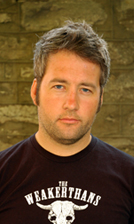On a rainy afternoon in 1949, W.C. Heinz watched a beautiful young horse break its leg and then get shot in the head. And then he sat down and wrote about it for the readers of the New York Sun, ordinary men and women, commuters and shoeshine kids.
 More than 60 years after it was written, on deadline, on a typewriter, in a grandstand press box, “Death of a Racehorse” has earned a cult following among sportswriting’s romantics. But recognition came late, because Heinz didn’t define his era so much as he defied it. Other sportswriters were celebrated for their verbiage, their punny cleverness, their obscure references and nose-stretching metaphors. Heinz was a devotee of the words that aren’t there. “Death of a Racehorse” was his newsprint masterpiece, and its genius rests in its restraint.
More than 60 years after it was written, on deadline, on a typewriter, in a grandstand press box, “Death of a Racehorse” has earned a cult following among sportswriting’s romantics. But recognition came late, because Heinz didn’t define his era so much as he defied it. Other sportswriters were celebrated for their verbiage, their punny cleverness, their obscure references and nose-stretching metaphors. Heinz was a devotee of the words that aren’t there. “Death of a Racehorse” was his newsprint masterpiece, and its genius rests in its restraint.
His lede isn’t some textbook grabber or purple prose. It’s informational. Heinz takes his time with us, because he has faith.
Where he’s quicker is in his establishment of the horse’s pedigree. In a single paragraph devoid of complete sentences, he makes sure we understand that Air Lift, son of Bold Venture, full brother of Assault, is a horse of potential.
Perfect details are the reward of great reporting, and great reporting builds the backbone of every great story. What’s harder to explain is what magic makes some details so essential and others not. Heinz could have done much more to tell us about Air Lift – so that later, we might be appropriately struck by the tragedy of its death. But he knows when he’s done enough.
That’s true throughout the piece. There are quite a few quotes, but not all of them are attributed. Imagine! Heinz quotes “somebody,” “one of them,” “the man.” Today a style guide-waving editor would demand names, ages, hometowns, occupations. But who really cares who said these things, so long as somebody did? This story feels relentless because it is. It never diverts. It never stops.
Early on, Heinz does name a person he’s quoting – a man named Jim Roach – but doesn’t bother to tell us who Jim Roach is, exactly. It turns out I couldn’t give a crap. He’s obviously a man who knows his horses, and that’s enough.
Enough, again and again and again. Heinz never makes the mistake of telling us too much, of becoming sentimental or maudlin. We see the blood. We hear the jockey’s crying. We shiver with each clap of thunder and the coming rain. These are the only things that matter in the world.
They moved the curious back, the rain falling faster now, and they moved the colt over close to a pile of loose bricks.
That’s my favorite sentence in this piece. Heinz uses “moved” twice, because that was the right word twice. I would wager that Heinz did not own a thesaurus. More important – and again, this is hard to explain – his choice to mention the pile of loose bricks, and the pile of loose bricks only, has always stuck with me.
He doesn’t do much else to set the scene. Yes, he describes some of the crowd, but only vaguely. He describes the coming storm. But he hasn’t written so much as he’s reported. Nearly every sentence in this story contains a fact and that’s about it. There are no metaphors or similes, unless you count his note that the gun is shaped like a bell. There are very few adverbs, and every quote is said – not exclaimed or opined or bleated. And in this place where this horse died, there was a pile of loose bricks.
This horse died out of the way. It died where useless things were left out in the rain. It died in a heap.
We know that not because Heinz told us so, at least not explicitly. We know that because the horse died beside a pile of loose bricks.
And then at the end, when a lesser writer would have tried to drive his point home – look at this tragedy, at this terrible and monumental thing… THIS IS WHERE THE STRINGS COME IN – Heinz returns again to his perfectly brutal facts.
Money horses are insured. Insurance companies demand physical evidence. Even in the face of such awfulness, people still run to get out of the rain, and they leave dead horses next to piles of loose bricks. Life can become death so quickly, in only an hour and a quarter; it waits in something as small as a hole in the track. And it can happen even for horses with the limitless potential of Air Lift, son of Bold Venture, full brother of Assault.
“Aw ----” someone said.
That was all they said.
That’s all W.C. Heinz said, too. The rest, he left up to us.
Chris Jones is a writer at large for Esquire and a contributor to Grantland.
For more from this collaboration with Longreads and Alexis Madrigal, check out the previous posts in the series. And stay tuned for a new shot of inspiration and insight every week.


